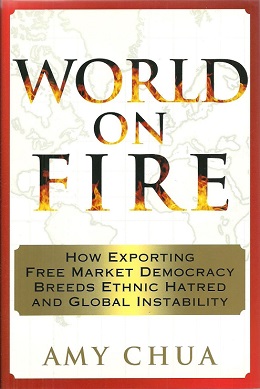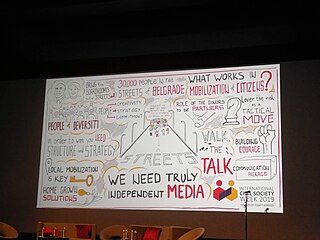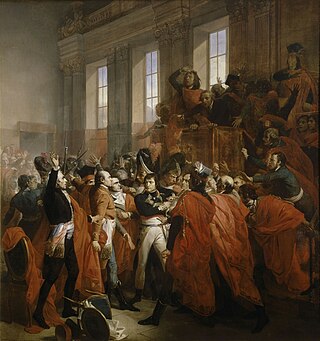
The Politics of Liberia takes place in a framework of a presidential representative democratic republic modeled on the government of the United States, whereby the President is the head of state and head of government; unlike the United States, however, Liberia is a unitary state as opposed to a federation and has a pluriform multi-party system rather than the two-party system that characterizes US politics. Executive power is exercised by the government. Legislative power is vested in both the government and the two chambers of the legislature.
Autocracy is a system of government in which absolute power is held by the ruler, known as an autocrat. It includes most forms of monarchy and dictatorship, while it is contrasted with democracy and feudalism. Various definitions of autocracy exist. They may restrict autocracy to a single individual, or they may also apply autocracy to a group of rulers who wield absolute power. The autocrat has total control over the exercise of civil liberties within the autocracy, choosing under what circumstances they may be exercised, if at all. Governments may also blend elements of autocracy and democracy, forming an anocracy. The concept of autocracy has been recognized in political philosophy since ancient times.

World War III or the Third World War, often abbreviated as WWIII or WW3, are names given to a hypothetical worldwide large-scale military conflict subsequent to World War I and World War II. The term has been in use since at least as early as 1941. Some apply it loosely to limited or more minor conflicts such as the Cold War or the war on terror. In contrast, others assume that such a conflict would surpass prior world wars in both scope and destructive impact.

World on Fire: How Exporting Free Market Democracy Breeds Ethnic Hatred and Global Instability is a 2003 book by American legal scholar Amy Chua. It is an academic study of ethnic and sociological divisions in the economic and political systems of various societies. The book discusses the concept of "market-dominant minorities", which it defines as ethnic minority groups who, under given market conditions, tend to prosper, flourish, and dominate economically, often significantly, over other, often ethnic majority groups in the country.

Civil society can be understood as the "third sector" of society, distinct from government and business, and including the family and the private sphere. By other authors, civil society is used in the sense of 1) the aggregate of non-governmental organizations and institutions that advance the interests and will of citizens or 2) individuals and organizations in a society which are independent of the government.
In political science, a political system means the type of political organization that can be recognized, observed or otherwise declared by a state.

Democratization, or democratisation, is the democratic transition to a more democratic political regime, including substantive political changes moving in a democratic direction.

Proponents of "democratic peace theory" argue that both liberal and republican forms of democracy are hesitant to engage in armed conflict with other identified democracies. Different advocates of this theory suggest that several factors are responsible for motivating peace between democratic states. Individual theorists maintain "monadic" forms of this theory ; "dyadic" forms of this theory ; and "systemic" forms of this theory.
An illiberal democracy describes a governing system that hides its "nondemocratic practices behind formally democratic institutions and procedures". There is a lack of consensus among experts about the exact definition of illiberal democracy or whether it even exists.
Authoritarianism is a political system characterized by the rejection of political plurality, the use of strong central power to preserve the political status quo, and reductions in the rule of law, separation of powers, and democratic voting. Political scientists have created many typologies describing variations of authoritarian forms of government. Authoritarian regimes may be either autocratic or oligarchic and may be based upon the rule of a party or the military. States that have a blurred boundary between democracy and authoritarianism have some times been characterized as "hybrid democracies", "hybrid regimes" or "competitive authoritarian" states.

A coup d'état, or simply a coup, is an illegal and overt attempt by the military or other government elites to unseat the incumbent leader. A self-coup is when a leader, having come to power through legal means, tries to stay in power through illegal means.
Anocracy, or semi-democracy, is a form of government that is loosely defined as part democracy and part dictatorship, or as a "regime that mixes democratic with autocratic features". Another definition classifies anocracy as "a regime that permits some means of participation through opposition group behavior but that has incomplete development of mechanisms to redress grievances." The term "semi-democratic" is reserved for stable regimes that combine democratic and authoritarian elements. Scholars distinguish anocracies from autocracies and democracies in their capability to maintain authority, political dynamics, and policy agendas. Similarly, the regimes have democratic institutions that allow for nominal amounts of competition. Such regimes are particularly susceptible to outbreaks of armed conflict and unexpected or adverse changes in leadership.
A hybrid regime is a type of political system often created as a result of an incomplete democratic transition from an authoritarian regime to a democratic one. Hybrid regimes are categorized as having a combination of autocratic features with democratic ones and can simultaneously hold political repressions and regular elections. Hybrid regimes are commonly found in developing countries with abundant natural resources such as petro-states. Although these regimes experience civil unrest, they may be relatively stable and tenacious for decades at a time. There has been a rise in hybrid regimes since the end of the Cold War.
Barbara F. Walter is an American political scientist who is the Rohr Professor of International affairs at the School of Global Policy and Strategy at the University of California, San Diego. She is known for her work on bargaining theory and political violence, especially the outbreak and resolution of civil war, and the logic of terrorist violence. Since 2012, she has been a permanent member of the Council on Foreign Relations.

The assessment of risk factors for genocide is an upstream mechanism for genocide prevention. The goal is to apply an assessment of risk factors to improve the predictive capability of the international community before the killing begins, and prevent it. There may be many warning signs that a country may be leaning in the direction of a future genocide. If signs are presented, the international community takes notes of them and watches over the countries that have a higher risk. Many different scholars, and international groups, have come up with different factors that they think should be considered while examining whether a nation is at risk or not. One predominant scholar in the field James Waller came up with his own four categories of risk factors: governance, conflict history, economic conditions, and social fragmentation.

Democratic backsliding, also called autocratization, is "a process of regime change towards autocracy that makes the exercise of political power more arbitrary and repressive and that restricts the space for public contestation and political participation in the process of government selection". Democratic decline involves the weakening of democratic institutions, such as the peaceful transition of power or free and fair elections, or the violation of individual rights that underpin democracy, especially freedom of expression.

The Logic of Political Survival is a 2003 non-fiction book co-written by Bruce Bueno de Mesquita, Alastair Smith, Randolph M. Siverson, and James D. Morrow, published by MIT Press. It formally introduces and develops the selectorate theory of politics.

Democratic backsliding in the United States has been identified as a concern at both national and state levels of government since the late 2010s. Democratic backsliding is "a process of regime change towards autocracy that makes the exercise of political power more arbitrary and repressive and that restricts the space for public contestation and political participation in the process of government selection".

Seek and Hide: The Tangled History of the Right to Privacy is a nonfiction book by Amy Gajda, a Tulane University Law School professor. Published by Viking Press in 2022, Seek and Hide examines how the right to privacy has been viewed by the law and the public from the founding of the United States. A portion of the book was adapted for publication as an article in Wired.











